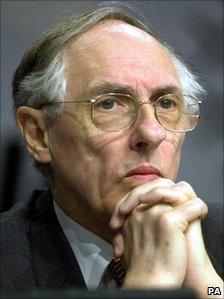Remembering Donald Dewar - a decade on
- Published

Mr Dewar died from a brain haemorrhage 10 years ago
Some things stay with you - and I recall only too well the events surrounding Donald Dewar's death a decade ago.
I recall the early indications that he had been taken to hospital "as a precaution" following a fall on the pavement outside his official residence on 10 October, 2000.
I recall the mounting concern as he was transferred to a neuro-surgical unit.
I recall the phone conversations late into the night in search of information, the emerging evidence that the situation was hopeless.
I recall bustling around the old BBC newsroom, in Glasgow's Queen Margaret Drive, in the early hours of the 11th, advising nobody in particular: "Present tense, present tense." By that, I meant, of course, that the first minister was still alive, had not yet passed.
I recall the sombre, formal announcement by David Whitton, his voice breaking.
I recall that we extended our lunchtime TV programme on the 11th, staying on air for that announcement and the aftermath.
Now, 10 years on, I have been revisiting those events, speaking to those who were most closely and directly involved.
Donald Dewar campaigned for decades to restore Scotland's Parliament.
He argued for devolution long before it was established orthodoxy within his own Labour Party.
But, with his objective achieved, he was to spend just one year as first minister in that new, devolved democracy.
He died from a brain haemorrhage. With grim irony, the internal bleeding prompted by the fall was worsened by medication which he was taking to help counter a cardiac condition.
He had undergone heart surgery earlier in the year.
For my programme, I have spoken to Sam Galbraith.
He was a close friend of Donald Dewar, a cabinet colleague - and a neuro-surgeon.
He first spotted that the first minister was ailing in the spring of 2000 - and told him to seek help.
I have spoken to David Whitton, then a special adviser to the first minister, now an MSP, who tells the inside story of a developing tragedy.
I hear from Gordon Brown, then chancellor, later prime minister. He explains how the news of Donald Dewar's illness shocked his friends and colleagues in Scotland and further afield.
And I have spoken to Marion Dewar, the late first minister's daughter.
In her first full interview since her father's death, she tells of the sadness at a life cut short. She tells of the emotion she experienced when the crowds lining the streets for her dad's funeral burst into applause as the coffin passed.
She tells, too, of her father's sense of fun. Not something, she concedes, for which he was perhaps universally renowned.
Then the legacy. Donald Dewar died after a single, troubled year in office as first minister, dogged by controversies like Clause 28 and the Holyrood building project.
He died before devolution could be thoroughly road-tested, in success and adversity.
Yet now, 10 years on, the political structure he created has endured, entrenched within Scottish politics.
John Swinney, then leader of the SNP, now finance secretary in the Scottish government, pays tribute to Donald Dewar's endeavours - even although, of course, he would want to go much further down the road of Scottish self-government.
I hear from Donald Dewar's Liberal Democrat coalition deputy, Jim Wallace, and from the then Conservative leader David McLetchie.
And I've been to Drumchapel, in the late first minister's former Glasgow constituency.
Folk there remember Donald Dewar's constant effort to help them - and his personal fondness for sweeties.
Ten years on, I can think of worse tributes.